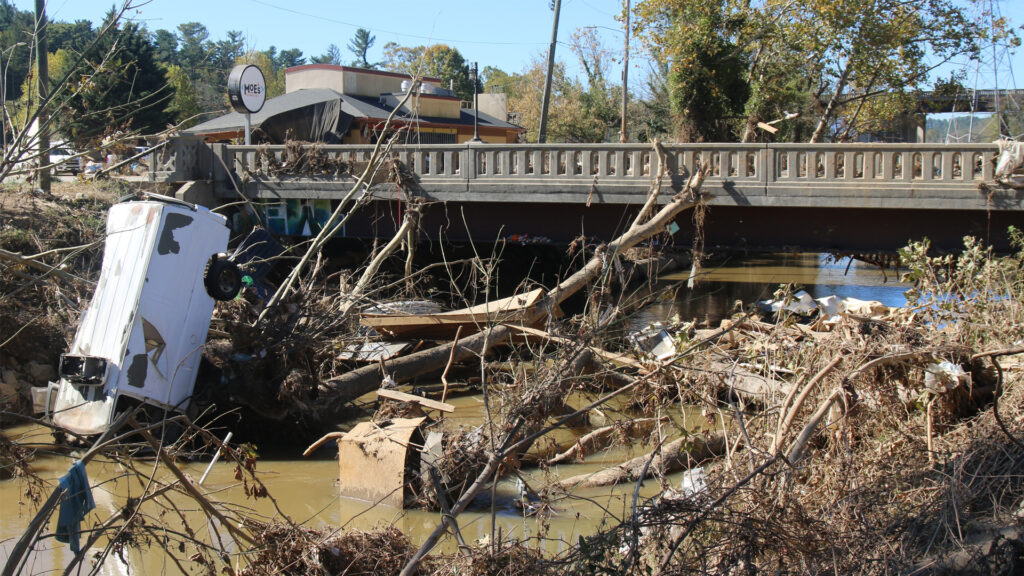By Chris Sprowls and Melissa Roberts
President Donald Trump has highlighted our broken federal disaster system and the urgent need for states to lead. As former speaker of the Florida House of Representatives and executive director of the largest national coalition of flood-impacted communities and elected officials, we agree.
With the Southeast staring down a decade-long recovery from Hurricane Helene and Los Angeles still on fire, hundreds of billions of taxpayer dollars hang in the balance. It’s time for a new playbook.
Our combined experience — leading the Florida House of Representatives and running the top adaptation nonprofit in the country — present a roadmap for the immediate and longer-term steps for the Trump Administration and 119th Congress to fix our broken disaster recovery system and usher in a safer, more prosperous America:
Cut waste by streamlining access to disaster aid

Towns in western North Carolina were without water for over a month after Helene. People’s homes and livelihoods in California have gone up in flames. At the worst moment in their lives, they shouldn’t be bounced between different agency websites and long wait times. Instead, they should upload their information one time, in one place, and receive relief so they can rebuild. Congress should pass commonsense proposals, like the bipartisan Disaster Survivors Fairness and Disaster Assistance Simplification Acts, to cut federal red tape and fix the process.
End pointless delays that stall recovery
After a disaster, states and communities don’t need bureaucratic headaches. But that’s the reality with the U.S. Housing and Urban Development’s Community Development Block Grant Disaster Recovery program. Right now, they have to wait for HUD to write new rules for every disaster, holding up resources for years. State and local governments need clear, consistent rules with flexibility to rebuild as they see fit. There are over 60 members of the new Department of Government Efficiency Caucus committed to a lean federal government. They should start streamlining government and empowering states by permanently authorizing the Community Development Block Grant Disaster Recovery program.
Harness American technology to respond smarter
The federal government verifies disaster damage the same way it did 50 years ago: sending Washington, D.C., bureaucrats to complete tedious assessments. We have satellites orbiting hundreds of miles above Earth that can detect blades of grass, but after a hurricane, our government asks communities to give geocoordinates of every downed tree. Congress should direct the Federal Emergency Management Agency to harness private sector technology to ensure faster, more accurate damage assessments that do right by survivors and taxpayers.
Defend our national security
America is the world’s greatest military superpower, but our dominance is threatened by our adversaries and disasters. Luckily Trump’s administration is employing new thinking and has the talent to empower a top federal official housed in the National Security Council focused on hardening our military and critical infrastructure. In Florida, for example, the governor appointed a strong leader to make residents safer and stretch tax dollars further.
While the administration and Congress should move right away on these immediate wins, we should also seize the following, longer-term opportunities:
Unleash state leadership
Trump is right — states should lead disaster response and recovery. States know how to direct federal funds, work with local leaders on shared priorities and recover better prepared for the next disaster. Florida, South Carolina and Texas have taken the reins in managing disasters. Congress has already drafted bipartisan legislation that would give states flexibility, funding and accountability to lead. Congress should seize on this wave of change, put states in charge and get legislation passed.
Eliminate redundant programs

The federal bureaucracy has ballooned to 30-plus entities owning parts of disaster recovery, all with different definitions and requirements. The complexity is staggering and only benefits highly paid consulting firms that help wealthy states and communities navigate the maze. We need to dramatically reduce the number of federal cooks in the kitchen. Congress has done it before — In 2012, it consolidated an unwieldy system of 90 transportation programs down to just 30 with reforms focused on efficiency, effectiveness and accountability. Congress should do the same with disaster programs.
Bet on American innovation by establishing a national lab for resilience
Right now, we’re lagging behind the world on disaster research and development. In addition to hurting communities at home, we’re ceding ground to Europe and China. American innovators should be leading the world in developing new technologies and strategies to prepare for and respond to disasters. By establishing a National Lab focused on solutions needed at home, the Trump administration can reclaim American leadership in this key arena.
By following this roadmap, and Trump’s leadership, Congress can seize a once-in-a-generation window to overhaul our broken, business-as-usual approach to disasters. As more Americans are impacted by these tragedies, we know it’s possible to make the system leaner, more efficient and accountable. Now is the time to do just that. Americans are counting on it.
Chris Sprowls, a Republican, is the former Speaker of the Florida House of Representatives. Melissa Roberts is executive director of the American Flood Coalition. This opinion piece was originally published by the Tampa Bay Times, which is a media partner of The Invading Sea.
Sign up for The Invading Sea newsletter by visiting here. To support The Invading Sea, click here to make a donation. If you are interested in submitting an opinion piece to The Invading Sea, email Editor Nathan Crabbe at nc*****@*au.edu. Banner photo: U.S. Airmen assigned to the Florida Air National Guard clear roads in Keaton Beach after the landfall of Hurricane Helene on Sept. 27, 2024. (Staff Sgt. Jacob Hancock/The National Guard, CC BY 2.0, via flickr).



